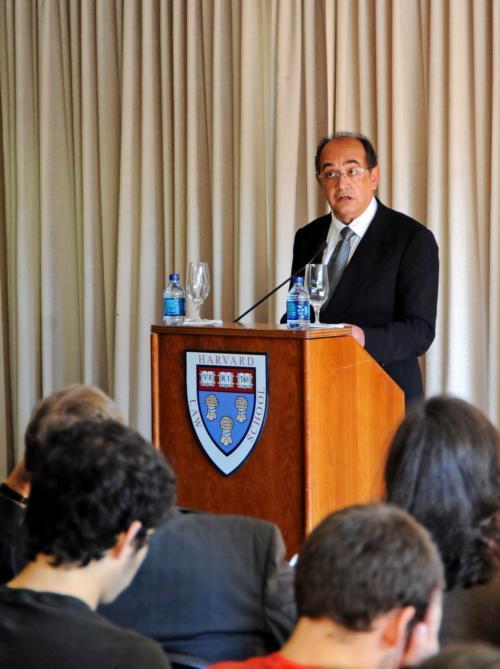
News
Garber Privately Tells Faculty That Harvard Must Rethink Messaging After GOP Victory

News
Cambridge Assistant City Manager to Lead Harvard’s Campus Planning

News
Despite Defunding Threats, Harvard President Praises Former Student Tapped by Trump to Lead NIH

News
Person Found Dead in Allston Apartment After Hours-Long Barricade

News
‘I Am Really Sorry’: Khurana Apologizes for International Student Winter Housing Denials
Brazilian Judge Draws Crowd at HLS
President of the Brazilian Supreme Court spoke on constitutional law

President of the Brazilian Supreme Federal Court Gilmar Ferreira Mendes spoke about the Brazilian constitution to a packed conference room in Harvard Law School’s Pound Hall, yesterday afternoon.
Mendes was appointed to the Brazilian Supreme Federal Court in 2002, and became the President of the Court in 2008.
Billy Magnuson and Alex Crohn, the co-editors-in-chief of the Harvard International Law Journal said that Mendes initially informed them that he would be in the Cambridge area and available to speak this month.
“Justice Mendes has a lot of experience with comparative law,” Magnuson said. “We have a lot of the same issues, for example, affirmative action, gay rights, women’s rights.”
Justice Mendes’ 30-minute talk placed the Brazilian judicial system within the context of international law and examined the similarities and differences between Brazil and other countries such as the US and Germany.
“Knowing about the specifics of different [judicial] models will encourage the search of dialogue among legal scholars from different systems of adjudication,” Mendes said.
After his talk, he answered questions from students and professors about issues of affirmative action, health care, social, gender, and racial inequalities.
“We are now celebrating 20 years of the enactment of the 1988 Brazilian constitution. This is actually something quite remarkable,” Mendes said, noting that Brazil is currently experiencing the longest period of democracy in its history. “The constitution was enacted at a very special, historic moment, after 20 years of military dictatorship in Brazil—[it] has survived very difficult institutional moments.”
Joao Sa, an exchange student from Brazil said that he was drawn to Mendes’ talk because of their shared heritage.
“Justice Mendes gives very relevant decisions in Brazil and has a very strong personality. He does not follow his colleagues,” he said.
Harvard Law School has a number of connections with Brazil including an exchange program with the Brazilian University, Fundacao Getuilio Vargos.
Well-known, Harvard Law professor, Roberto M. Unger also took leave in June 2007 to advise Brazilian President Luiz Inácio Lula de Silva.
Want to keep up with breaking news? Subscribe to our email newsletter.
